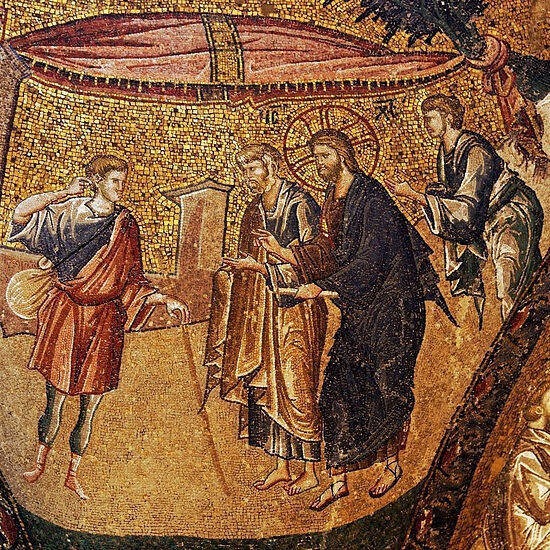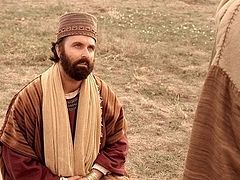A certain man said to Christ, Good Teacher, what must I do to inherit eternal life? A very good question, the most important question in the world, more important than all others. Until a person rises to this question, all the answers he gets in life are not about that, because he is thinking about the wrong things, looking for the wrong things.
What must I do to inherit eternal life? he turns to Christ, calling Him a Teacher. Whoever seeks eternal life must come to Christ as his Teacher. And no one can attain this life unless he becomes a disciple of Christ. The Holy Church has called us throughout all ages, and especially today, to realize that we are disciples of Christ, that we are called to learn holiness from Christ God Himself.
The Lord hears the appeal: “Good teacher!” and answers: Why do you call Me good? No one is good but God alone. He wants to tell this man that he who turns to Christ with reverence as a great Teacher of goodness and morality, does not really understand that he is talking to the Living God Himself. It is necessary for him to learn that there is only one God Who is truly good. And every person, even the kindest, is made so because he participates in God.
The Lord does not catch anyone on a bad word or a bad deed. He always wants to make everything that went wrong seem like it didn’t, if He sees a person’s sincere aspiration. And everything that is good, the Lord wants to make not just good, but truly good, infinitely better and perfect. And this is what our life leads to.
Christ says that the way to eternal life is through the commandments of God. And again, at a new depth, He reveals to us the meaning of what seems to be well known to all of us, what we have heard many times. This is what is most important for a person: to learn not to kill, not to steal, not to fornicate, to honor father and mother. This is the science of sciences and the art of arts. It is more important than all the wisdom, all the knowledge combined, which exists in the world. If a person does not learn this, he has not learned anything in life, everything is in vain. And he can learn this, the holy fathers say, only by doing what the Lord requests.
The man who turned to Christ (Matthew’s Gospel says it was a young man) is a very responsible man. From his youth he has kept the whole Law. No one can reproach him, not even Christ. But there is undoubtedly a desire in this man to go further, to achieve more. This is what delights and touches the Lord in him. Jesus looked at him and loved him. And for this reason, the Lord offers him a path that will give him the opportunity to live on an incomparably more wonderful level. The Lord is very demanding. He is asking for more, much more than what the ancient Law required. He reveals a new world, the ideal of which is not the observance of the Law, no matter how beautiful, just and true it may be, but a call to become perfect, as God the Father is perfect. That is why such a great transition is proposed: Go your way, sell whatever you have and give to the poor, and you will have treasure in heaven; and come, take up the cross, and follow Me (Mk 10:21). From now on, it is not the Law that matters, but the Lord Jesus Christ Himself. He must be followed.
But it is impossible to follow Christ with such heavy baggage as this man has. He lacks courage. He is attached to his estate. He loves what his wealth can provide for him. But he was sad at this word, and went away sorrowful, for he had great possessions. (v. 22) The wealth he possesses does not prevent him from hearing what Christ says and understanding what Christ says, but it prevents him from responding to the call of Christ. As a result, he is filled with great sadness.
There are many people who live piously, do everything, go to church, and believe in God. But when their faith is truly tested, it will be revealed that there is something in their lives for the sake of which they would rather break with Christ, rather than leave their wealth. It may be material wealth or any other kind of wealth.
“What is more precious to you,” Christ asks, “this world with all its values, perhaps very wonderful, or eternal life? God, or something else? If Christ is really the most precious thing to us, then we will follow Him no matter what it costs us. Whoever does not follow the Lamb of God wherever He goes, cannot be called a disciple of Christ, and will not inherit the Kingdom of Heaven. Perhaps the hour of decisive choice has not yet come for us, when we must either leave everything or part with Christ. But many, the Lord tells us today, will forsake Him, even if they don't want to. Everything is determined in the end by the ultimate integrity of love for God and love for the other person.
And Christ, looking at His disciples, says: Children! How hard it is for those who have riches to enter the kingdom of God! We understand that this choice—either to leave everything we have or to part with Christ—may seem too harsh. But in fact, Christ—are we fully aware of this?—does not require us to do what is unreasonable. And we know our weakness, how attached we are to the world, to this or that kind of wealth.
The choice that the Lord puts before us is serious and profound. He wants us to keep going forward all the time, higher, and further. He sees the great things that are in store for us—greater than what we see. And we must realize our calling. There is a great temptation to stop, to say we’ve done enough, we’ve gone far enough. And it is no less tempting to think that the Lord demands something that is beyond our strength. Is it so? Have we not forgotten that the things which are impossible with men are possible with God? The Lord grieves more than the one who forsakes Christ for the sake of earthly things, but He with His grace and His Providence does not abandon anyone. He rejoices together with the Angels, over everyone who returns to Him. And everyone who leaves everything to follow Christ finds in the end eternal life, the Lord Himself.
The word of God that we hear can transform us. It can liken us to God Himself. Do we want this miracle to happen? Do we accept the gift of surpassing ourselves? We must answer this question with candor. Let us hear this call of God and follow our Lord while we are still on earth, before it is too late, before death closes the doors of repentance and love to us forever.
From: Explanation of the Gospel For Every Day of the Year




